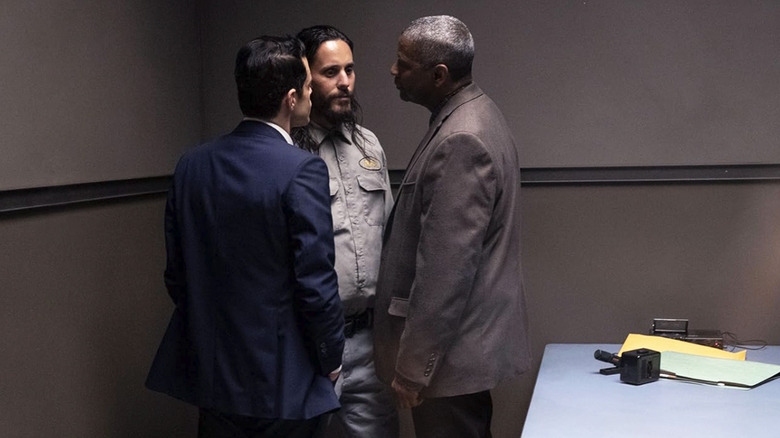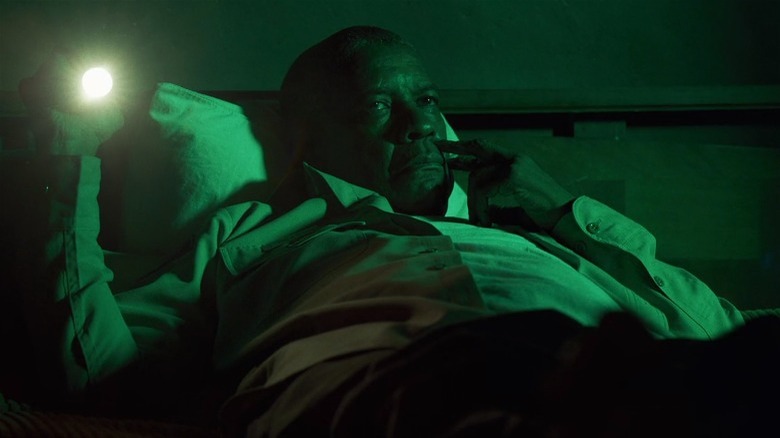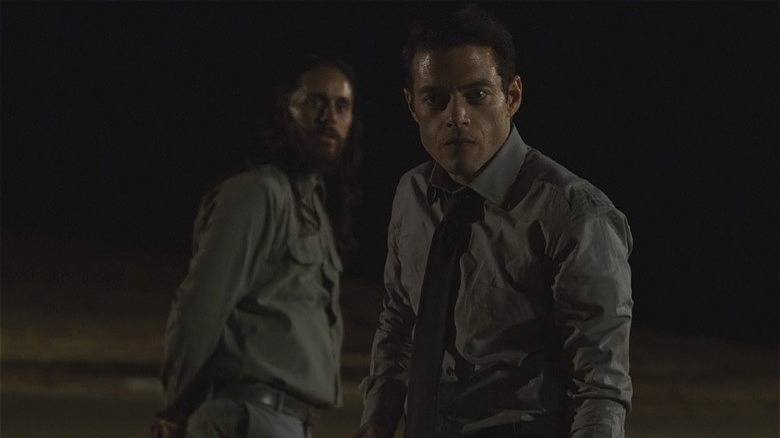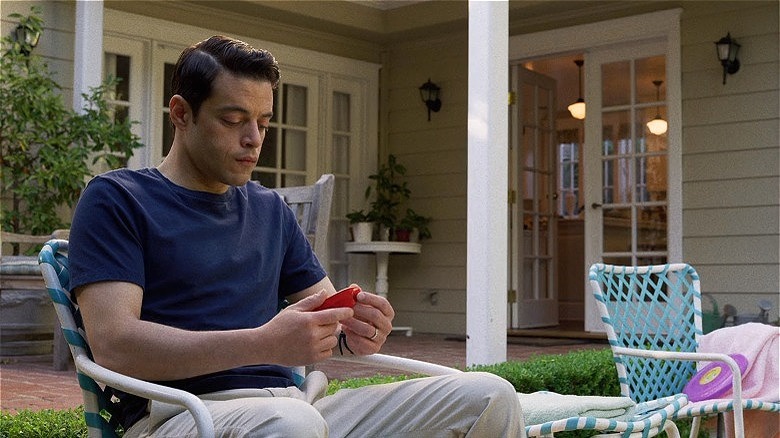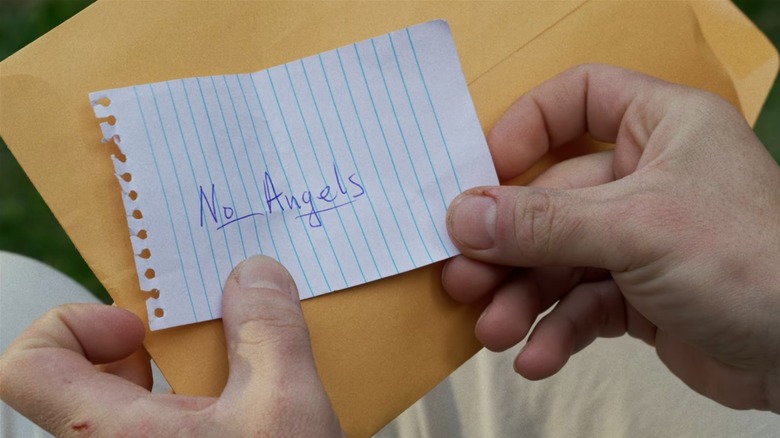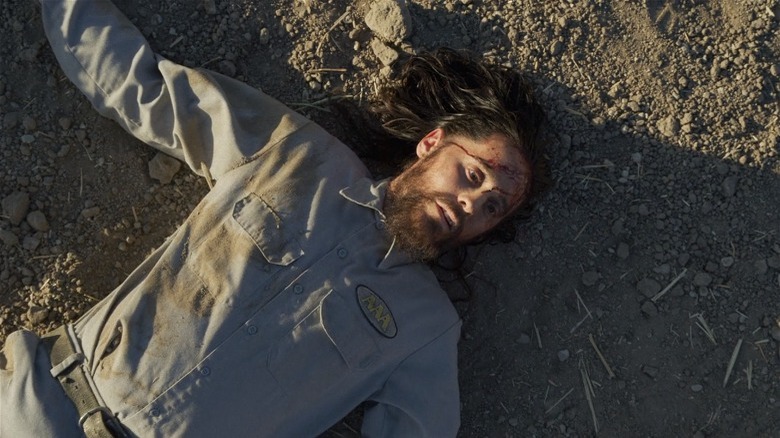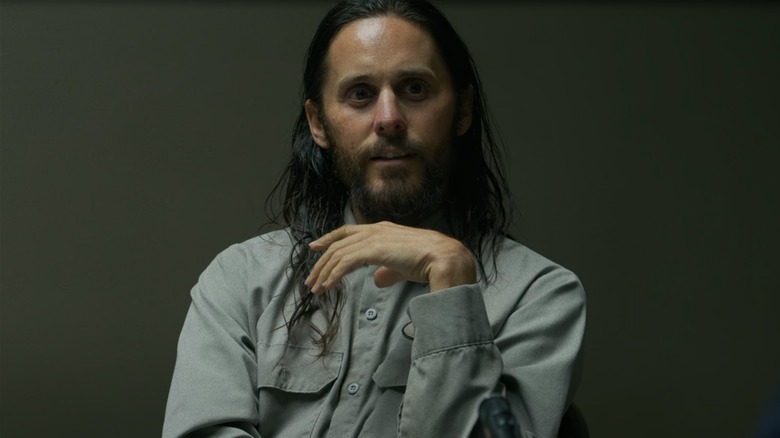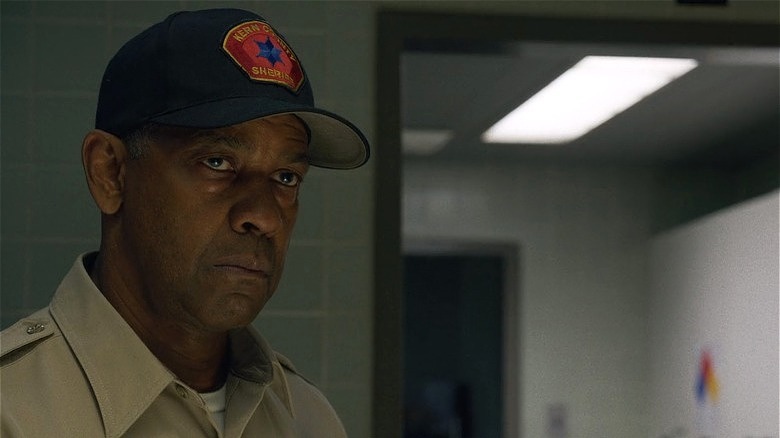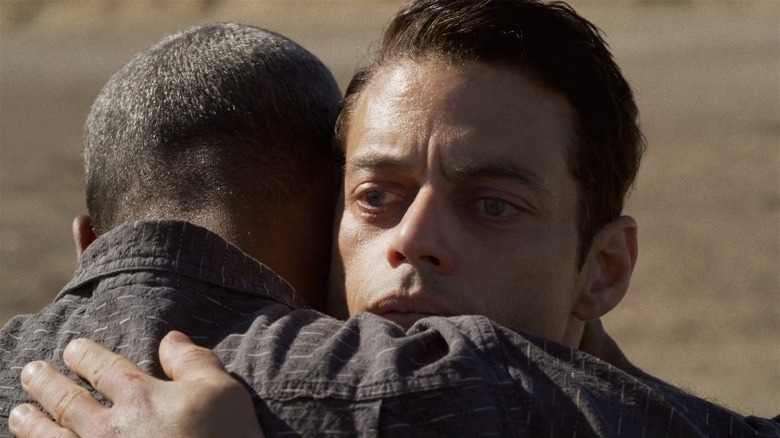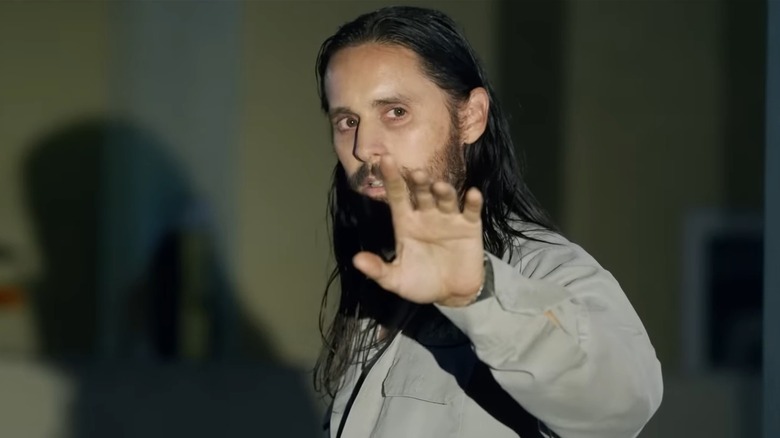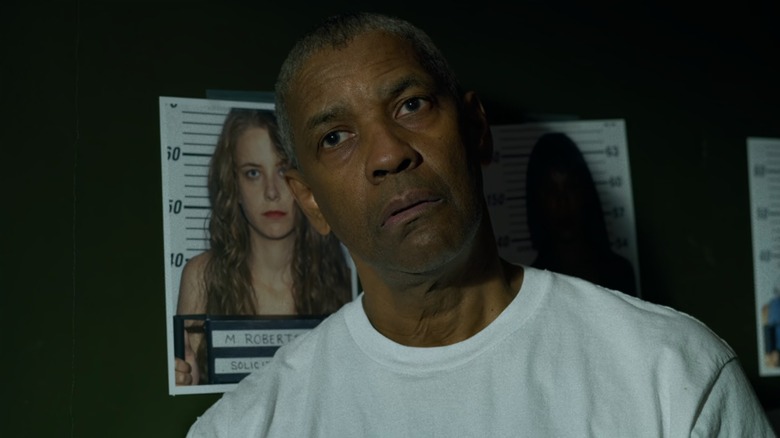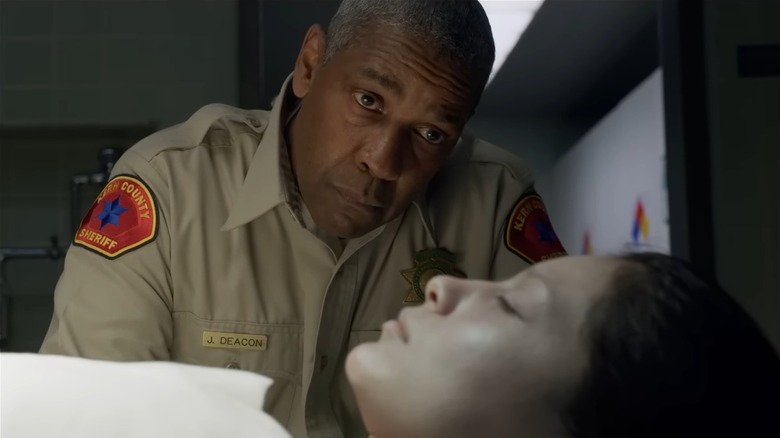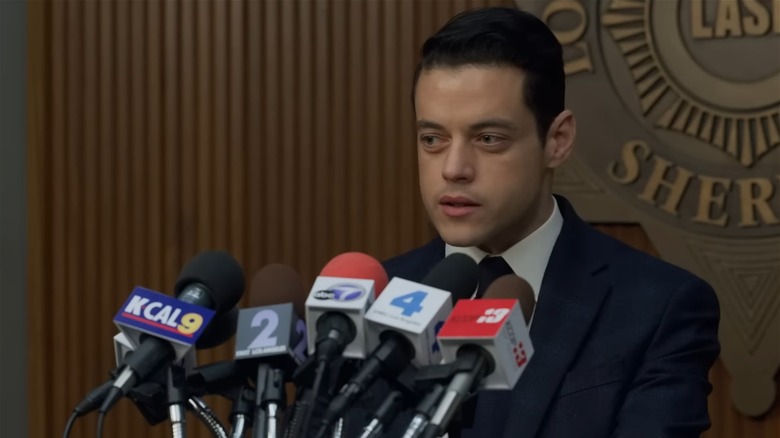The Little Things Ending Explained: Unsolved Mysteries Let The Terror Linger
We may receive a commission on purchases made from links.
John Lee Hancock's crime drama "The Little Things" premiered in theaters and on HBO Max in January 2021, one of the first films to be released under the COVID-induced deal whereby Warner Bros. films hit the streamer the same day as cinemas. The film involves a serial killer terrorizing Los Angeles in the early 90s, and it follows the two detectives on his tail, trying to catch him before he kills again. Really, though, it's about the cops' obsession with the case and the way that obsession leads them to disregard their morals.
"The Little Things" currently sits at 44% Fresh on Rotten Tomatoes. Many reviews mention the film's unsatisfying ending as a mark against it; after all, "The Little Things" leaves viewers with more questions than answers, which is not what you expect from a detective story. Still, the movie looks great and boasts a talented cast; even Jared Leto turns in a chilling performance as the detectives' number one suspect.
"It's the little things that are important, Jimmy," Denzel Washington's character Joe Deacon tells Rami Malek's Detective Jim Baxter. "It's the little things that get you caught." Understanding the ending of "The Little Things" — not just what happened, but why the filmmaker went down this route — requires paying attention to, well, the little things. Read on for a look back at "The Little Things" as we attempt to explain that ambiguous ending.
What you need to remember about the plot of The Little Things
In early-'90s L.A., a serial killer stalks women. "Six bodies, no witnesses, no evidence, no killer," someone says, summing up the situation. Detective Jim Baxter is on the case, as is Joe Deacon, a former LAPD detective who transferred upstate after an unsolved case ruined him five years earlier and led to both a divorce and a heart attack. Visions of the victims whose deaths he failed to close haunt Deacon. At first, Baxter and Deacon don't get along, but Baxter realizes the older, more experienced detective might be of help.
When a woman is killed and left posed naked near her broken refrigerator, Deacon follows a lead to a nearby appliance repair shop. There, he sets his sights on Albert Leonard Sparma (Jared Leto). He tails the sunken-eyed, stringy-haired Sparma through the night and into the morning before realizing Sparma is toying with him. Baxter hauls him in for questioning, and during the interrogation, he taunts the cops, describing himself as a "crime buff" who knows the case. Deacon notes that Sparma has become aroused while looking at photographs of dead bodies. Meanwhile, a witness who may have escaped him at the start of the film can't be used because she saw Sparma in handcuffs. They let him go.
Deacon breaks into Sparma's apartment and finds a box of newspaper clippings, but Sparma calls in an "officer down" at his apartment and Deacon narrowly escapes.
What happened at the end of The Little Things?
Sparma takes Baxter to a remote field of dirt, promising to show where he buried a missing jogger. Sparma directs Baxter to a specific spot, but when Baxter digs, he finds nothing. Sparma points out another spot, and another, taunting him. "I've never killed anybody in my entire life," he says. "If you believe me, we can get in the car and we can drive straight home." Baxter continues digging. When Sparma brings up Baxter's family, things turn ugly. "You're insignificant," he spits. "You don't matter. This'll go on and on and on, and there's nothing you can do about it."
Baxter snaps. He hits Sparma with the shovel, killing him instantly. Deacon arrives a moment too late, and we learn through flashback that Deacon has been tormented by his past case because he's the one who accidentally killed one of the victims, then covered up his own crime with the help of a colleague. He returns the favor, directing Baxter to bury Sparma. He heads back to the city, ditches Sparma's car, and puts everything in his apartment in trash bags.
When he returns to the crime scene, he finds that Baxter has continued digging holes instead of burying the body. He warns Baxter that the only way Sparma comes back to haunt him is if Baxter slips up. After they part ways, Deacon sends a shell-shocked Baxter a red barrette, and then he burns Sparma's belongings.
What's the significance of the red barrette?
Early in the film, we see a jogger followed down a dimly lit street by a car that looks like the killer's. She wears a red barrette. Later, Detective Baxter meets with the parents of Rhonda Rathbun, a young woman who's gone missing. They tell Baxter, "When she ran, she always used a red barrette to hold her hair back." Even later, after Deacon breaks into Sparma's apartment and finds his box of newspaper clippings about the murders, Baxter asks him if he also saw a red barrette. Clearly, the detective has come to view this red barrette as a totem, a meaningful object that will definitively tie Sparma to the missing jogger (and therefore, likely the rest of the killings).
At the end, when Deacon sends Baxter a red barrette, we think at first that he must have found it when he was bagging up Sparma's apartment. If so, that would mean Baxter's killing of Sparma was ... not justified, exactly, because cops should not be extra-judicially killing suspects. Still, it would at least suggest that the murders will stop.
Instead, moments later, we see Deacon also burning a packet of barrettes with the "Candy Apple" one missing. We can therefore conclude that Deacon bought a red barrette to release Baxter from his guilt, not wanting him to suffer for years in the same way Deacon has. "The Little Things" ends on this ambiguous note, denying us a resolution.
What's the significance of the 'No Angels' note in The Little Things?
At the end of "The Little Things," when Deacon sends Baxter a red barrette, he also includes a handwritten note that simply reads, "No Angels." It's even underlined for emphasis, showing that it's an important message. But ... what does "no angels" mean?
The note is a reference to an earlier conversation between Baxter and Deacon. The older detective warns the younger one not to get too obsessed with the case, letting him know that it's only natural for cops to look at themselves as the guardian angels of a killer's victims. It's not healthy to look at crime-solving that way, Deacon suggests, because it can lead a detective to be fixated on getting emotional justice for victims instead of simply looking at the facts of a case. They're not in "the angel business," he says.
By sending Baxter a message that reads "No Angels," Deacon is reminding his younger colleague that he needs to separate his emotions from his job. It works on a second level, too: They're not angels, because they've sought a form of justice far outside the legal system. It's not helpful to look at what they're doing as pure and holy, in other words, because their form of justice depends on something else entirely.
Who was the killer in The Little Things?
"The Little Things" ends without tying up its central mystery. Typically, detective films resolve the question of who's been committing the crime, but "The Little Things" cares little about that. Instead, it's more interested in how the case affects the two officers who become fixated on it. We are left pondering whether past mistakes should affect the future, and to what extent people should allow themselves (and each other) to be overwhelmed by guilt.
Still, it's natural to wonder: Was Sparma the killer? Does the film perhaps give the audience enough clues to solve the mystery, even if its characters don't definitively put its crimes to rest? The answer is ... not really. We know that Sparma followed the murders in the media, which a profiler says at the end of the film is something that the killer would do. We know he left town shortly after the previous round of unsolved murders. We know he tends to ditch his cars. And, I mean ... just look at the guy.
However, I think it's a more intriguing, darker film if he's not actually responsible. Perhaps he really is just a "crime buff," as he tells Baxter during his interrogation. Cops shouldn't be killing suspects just for having greasy hair, creepy though Sparma may be. This interpretation puts the blame on the police force not just for killing an innocent man, but for covering it up. It's something that happens all too often in real life.
Is The Little Things based on a real killer?
After watching "The Little Things," it's natural to wonder whether Sparma was based on a real killer. After all, he seems like a fully-realized villain. It helps that a lot of his traits are recognizable as typical serial killer markers commonly seen in films like this: He's a loner, a crime obsessive, and evidently a real creep, killer or otherwise.
Sparma is a totally fictional creation, but he was inspired by one particular real-life killer. Writer/director John Lee Hancock told GQ that he was interested in serial killer stories because of his own experience living in Los Angeles during one killer's reign of terror. "When I moved to LA, the Night Stalker stuff was happening," he said. "That was pervasive and everybody was locking their windows and talking about it nonstop. It seemed like it was just a pall over the entire city of Los Angeles. I'm sure that that had some impact on me."
He's referring to Richard Ramirez, known as "The Night Stalker." Ramirez was ultimately convicted of killing 13 people, having sexually assaulted many more. If you're interested in comparing that real-life case to "The Little Things," Netflix's "Night Stalker: The Hunt For A Serial Killer" is a solid true crime documentary series.
What has the cast and crew of The Little Things said about the ending?
In an interview with USA Today, Denzel Washington didn't offer any insight into the ending. He did, however, share an amusing anecdote from the set. It seems the veteran actor was happy to let his younger co-stars handle the more physical aspects of the film's climax. "They were out there digging and fighting and I was in my dressing room," he recalled. "I was like, 'How's it going out there? Are they still digging?' When I came out, there were a whole lot of holes out there. Ah, to be young again."
Director John Lee Hancock, on the other hand, spoke with Entertainment Weekly regarding some of the thornier implications of the film's ending. In particular, he handily dodged the question of whether Sparma was actually the killer. "... When I wrote it, I just tried to build in as many things pointing to his guilt as points to his innocence," he said. "I think there is an equal number of each in the script. I can make an argument either way."
Hancock recalled Jared Leto being dissatisfied with that ambiguity. "It's an ugly ending any way you look at it, it's all about the grey," Hancock recalled telling his star. That wasn't good enough. "He said, 'I think I have to come to a decision about this.'" Hancock asked him not to tell him what he decided, and he let Leto play it how he wished.
Is there an alternate ending to The Little Things?
With an ending as ambiguous as "The Little Things," it can sometimes be helpful to see alternate versions. Scenes and different takes the filmmakers tried that didn't make the cut can give us a clue as to their mindset while they made the film, which can sometimes help unlock a story.
In the case of "The Little Things," however, no such alternate ending exists. Director John Lee Hancock also wrote the script, and his initial draft — all the way back in the early 90s — ended much the same as it does today. He felt frustrated by the crime genre at the time, in particular growing tired of what he found to be pretty formulaic story construction. He told Entertainment Weekly that he always enjoyed the first two acts of a detective story, but the endings bored him. "By the time you'd get to the third act, you'd identified the bad guy, and then the good guy and the bad guy would go face-off, and then there would be a moment when the good guy was going to lose, but then the good guy wins heroically," he laid out. Instead, he tried something more unexpected.
Hancock knows that his ending won't work for everyone, and that doesn't bother him. He explained, "... There's nothing wrong with [wanting a more formulaic ending], but I wanted to try and do something that was different because that was what I was interested in."
The Little Things almost had a completely different ending
While no alternate ending was made for "The Little Things," that wasn't for lack of trying on the part of the executives. In an interview with GQ, John Lee Hancock revealed that he was pressured to change the end. "I had an exec [at Warner Bros.] tell me one time, 'This is a great script, it just needs a different ending. It needs to have a more formulaic ending. We need to know because the audience won't take this,'" he recalled.
It's a challenging ending the likes of which we don't often see in Hollywood — and which we definitely didn't often see at the time the script was written. Hancock understands that, reflecting, "To a degree, I'm sure he was right, but I just wasn't interested in that." After all, he pointed out, "That's the entire reason I wrote it, to subvert the genre and hopefully not thumb my nose at an audience but give them an ending that feels complete and fitting for the story that's been told."
He refused to re-write the ending, standing firm in his conviction that the ambiguous resolution was the point. We can imagine a version of this movie that gives us more answers, one that definitively tells us whether Sparma was the killer, or perhaps one where Baxter and Deacon face repercussions for how they handled the case. Hancock is right, though, that those versions of the movie would've been less interesting.
What's the point of The Little Things?
Usually, we expect a detective story to solve a mystery for us. We're used to seeing someone who's on the trail of a killer slowly put together a series of clues, ultimately leading to a revelation that describes exactly what's been going on and how all of the clues fit together.
"The Little Things," on the other hand, stubbornly resists giving us this kind of resolution. That's the point of the movie, in fact: That sometimes, life doesn't resolve neatly. Sometimes, we have to confront the fact that we've put our public trust in the cops, expecting them to keep order in the world, when in fact they're merely just humans. They're humans who fixate on "the little things," sometimes missing the overall picture in pursuit of their obsession with a case.
This is not just the story of a (potential) serial killer. It's a meditation on guilt, asking us to think about what "justice" really means in a world where our institutions can't protect us. Is guilt its own form of justice? Deacon's been haunted by what he did; is that, in some ways, worse than any punishment the legal system could dole out? By releasing Baxter from his guilt, is Deacon dodging justice for Sparma? Does Sparma deserve justice, even if he's a killer? "The Little Things" suggests that there are no easy answers, but the point of the movie is to get us thinking about those questions.
The Little Things was almost a totally different movie
While it took John Lee Hancock several decades to get "The Little Things" made, various other filmmakers were, at one point, going to take a stab at the material. The film was initially developed while Hancock had a deal with Steven Spielberg, and Hancock hoped the man behind "Raiders of the Lost Ark" would helm his movie. "I pitched it to him. I believe I faxed him a treatment of sorts or an outline of some document," Hancock told GQ. "He said that he didn't want to live in that dark world." After all, he was working on "Schindler's List" in the early 1990s, and a Spielberg version of "The Little Things" made in the wake of that movie would've undoubtedly been quite depressing.
Interestingly, several of the other directors who circled the film first made their names as actors, which perhaps speaks to the quality of the character work in the script. Hancock told GQ that Clint Eastwood considered directing the film, which makes sense since Hancock wrote the script for Eastwood's "A Perfect World." Eastwood's version of "The Little Things" could've been great, especially in the early 90s, as the filmmaker wouldn't have shied away from the moral ambiguity inherent in the story. Hancock also took several meetings with Warren Beatty, and even "Matilda" director Danny DeVito once considered it. Each of those filmmakers would've offered an intriguing vision for the film, but they certainly would've put their own mark on the script, potentially compromising Hancock's vision.
What do critics think about the ending of The Little Things?
When "The Little Things" was first released — mid-pandemic, remember, straight to the streaming service then called HBO Max — it received so-so reviews, and it's currently sitting at only 44% Fresh on Rotten Tomatoes. Our own /Film review liked the '90s feel of the thriller, but felt the movie ended up being rather predictable and lacking style.
But overall, as John Lee Hancock heard many times while trying to make the movie, the end proved to be polarizing. Some critics loved the ambiguity and others considered it unsatisfying, while still others liked the end but disliked the movie.
Brian Tallerico wrote a two-star review for RogerEbert.com, saying, "By the time it's over, it's hard to shake the feeling that it's added up to, well, nothing." Richard Lawson, at Vanity Fair, wasn't necessarily concerned with story-structure questions like "payoff," instead questioning the film's forgiving attitude toward its cop characters. "To simplify things just a little bit, that's exactly what Hancock's film does — delivering an ending that is ambiguous on some material fronts, but pretty determinative in terms of its lead characters' ragged nobility."
On the other hand, in a positive review for Entertainment Weekly, Leah Greenblatt wrote, "[This is] a serial-killer thriller reframed as a slow-burn mood piece more consumed with character and smolder, perhaps, than in the payoff of its central mystery." Similarly, Francesca Steele gave Hancock some credit in her review for iNews.co.uk, concluding, "It pulls an unexpectedly thought-provoking ending out of the bag, which makes me suspect that Hancock's intention was to subvert tropes all along."
